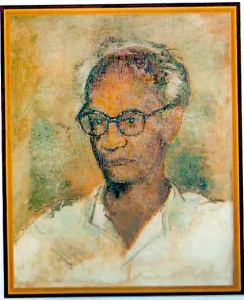The Trust keeps the flag flying
View(s):May 29 marked the 125th birth anniversary of Martin Wickramasinghe. We are reminded of the milestones in the outstanding writer’s life thanks to the work of the Martin Wickramasinghe Trust where a dedicated team led by Dr. Ranga Wickramasinghe keeps track. The Trust ensures that his popular novels and short story books are on the shelves of bookstores. Talks and presentations are held regularly in schools providing an  excellent opportunity for schoolchildren to participate in lively discussions. An excellent folk museum is run at Koggala. The author’s home is kept in topping condition. Annual get-togethers are arranged at Koggala for literary folk to meet and exchange ideas. Schools are encouraged to present cultural events at the premises. Quite a lot of work!
excellent opportunity for schoolchildren to participate in lively discussions. An excellent folk museum is run at Koggala. The author’s home is kept in topping condition. Annual get-togethers are arranged at Koggala for literary folk to meet and exchange ideas. Schools are encouraged to present cultural events at the premises. Quite a lot of work!
Maintaining a close rapport with the media has helped the Trust to obtain coverage for the events – the ones the Trust feels the public should be made aware of. I remember meeting Dr. Ranga about a decade ago to get some material for the column I was doing for the Funtimes – the children’s section in the Sunday Times. The chat ended in deciding to do a book on folk culture based on the material displayed in the Koggala Museum. ‘From the Cradle’ the coffee table book launched on Martin W’s 117th birth anniversary – was the result.
The Trust is always looking for new ideas and new approaches woven round the maestro’s vision and has the knack of picking the right people for the task. For instance, the Trust commissioned renowned writer W. A. Abeysinghe to write about the great man’s life, his work and his vision. It took five years to complete the assignment. At the end, a classic three-volume publication was released. ‘Martin Wickramasinghe Maha GathkaruVatha’ relates the story through eight decades on the contribution made by the country’s most outstanding literary figure of the 20th century.
Dividing Martin Wickramasinghe’s life into three phases, each volume discusses one phase. The first is from 1890-1947 – from birth until the end of his career as a journalist. When aged 30 he joined the Dinamina as a sub-editor, he had written his first novel ‘Leela’ (1914) and began writing a column under the pen-name ‘Hethuvadi’. Between 1920-25, he published four novels – ‘Soma’, ‘Iranganie’, ‘Sita’ &’Miringu Diya’ and the first collection of short stories, ‘Geheniyak’. After a short stint at ‘Lakmina’ he returned to Lake House and became editor of the Dinamina in 1932. By the time he left the Dinamina he was writing seriously and set up his own Mount Press at Mount Lavinia, where the family resided in their own house.
The second phase -1947-57, was considered as the most dynamic period of his life. Much had happened in the political, social and cultural scenario in Sri Lanka. In addition to being a novelist and short story writer, he made a name for himself also as a dramatist, poet, literary and social analyst. He had 23 publications to his credit including four English titles in this period.
The final phase until his death in 1976 saw him continuing to write, going on several tours abroad, gaining recognition from universities. He received a honorary doctorate from Vidyodaya University-1960 and D.Litt. from Peradeniya University-1963/Vidyalankara University 1965 and University of Ceylon-Colombo 1970; his ‘Viragaya’ won the Don Pedris Award for best novel (1962), ‘Gamperaliya’ was made into a film by Lester James Peries in 1963 (it won three awards including the Golden Peacock at the Delhi International Film Festival 1965), several books were translated (‘Madol Duwa’ into Chinese 1961, Rumanian 1962 & English1976/ ‘Gamperaliya’ into Tamil 1964/ ‘Gamperaliya’, ‘Kaliyugaya’ and ‘Yuganthaya’ trilogy as a composite Russian publication 1966 and being honoured with the Presidential Award 1974. He had been awarded the MBE by Queen Elizabeth II in 1963.
The Trust published two volumes of short stories – also edited by Abeysinghe under the title ‘Martin Wickramasinghe Keti Katha Ekatuva’. Starting with ‘Geheniyak’ in 1924, he had published 112 collections of short stories from 1924-51.
Conscious of the interest shown by the English readership in Martin Wickramasinghe’s books, several translations done by well-known English scholars have been released and more are to follow. Ranga Wickramasinghe himself translated ten short stories written by his father – ‘Martin Wickramasinghe – Selected Short Stories’.
Meanwhile, several of his novels made into films and teledramas have been well received.
The hard work done by Ranga Wickramasinghe and his team is greatly appreciated.
Well done – continue the good work.


